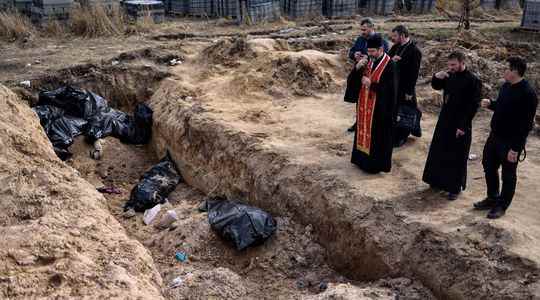In the areas devastated by the Russian offensive, it is the turn of the NGOs to piece together the puzzle. Published on Friday 6 May, the Amnesty International report entitled “He’s Not Coming Back’: War Crimes in Northwest Areas of Kyiv Oblast” said to provide “irrefutable evidence of Russian war crimes committed in February and March 2022 in towns and villages northwest of kyiv”, during the advance of the armed forces commanded by Moscow on the Ukrainian capital. This in-depth investigation is based on dozens of civilian testimonies and a precise analysis of material evidence.
To carry out its research, an Amnesty International delegation interviewed survivors and families of victims, and met senior Ukrainian officials. The team spent twelve days in April investigating murders in Boutcha, Borodyanka, Novyi Korohod, Andrivka, Zdvyzhivka, Vorzel, Makariv and Dmytrivka. For 44 pages, Amnesty International examines the most serious forms of violence. Its conclusion is clear: Russian forces must be brought to justice for the war crimes committed in the region northwest of kyiv.
During its synthesis, Amnesty International returns to the massacre of Boutcha, a town on the outskirts of kyiv, where images of the bodies of civilians have aroused strong international reactions. In early April, after the Russian army withdrew from the area, Ukrainian authorities said that at least 300 civilians had been killed in Boutcha alone. Faced with the atrocities committed inside the Ukrainian city, the work of the NGOs was to collect evidence of possible war crimes. Amnesty International has documented “22 cases of unlawful killings by Russian forces in Boutcha and nearby areas northwest of Kyiv, most of which were apparently extrajudicial executions.”
Bullets attributed to Russian weapons at execution sites
According to the NGO, five men were so executed in five separate incidents between March 4 and March 19, in a complex of five buildings spread around a courtyard northwest of the Yablunska/Vodoprovidna intersection. On several pages, the testimonies of the relatives of the victims scroll, describing the horror they experienced. Among the victims: Yevhen Petrashenko, 43-year-old commercial director and father of two children. Amnesty reveals that he was shot on March 4 in his apartment. At the crime scene, bullets were found to be 9×39 mm armour-piercing shells. They could only be fired from rifles used by a few specialized Russian units, the report describes.
The NGO obtained the testimony of his wife Tatiana: “Yevhen was lying dead in the kitchen. He had been shot in the back, near his lungs and his liver. His body remained in the apartment until the 10 March, when we were able to bury him in a shallow grave in the yard.” A week later, Leonid Goy, the neighbor who had discovered the lifeless body of Evhen Petrashenko, was also killed.
Still according to the Amnesty International researchers, many relatives of the victims say they are not satisfied with the treatment of the remains: “The members of the families of the victims noted that the management of the bodies had been chaotic, that they had not been kept properly informed and that the bodies had in some cases not been correctly identified.”
Separately, Amnesty International has investigated the cases of two civilians killed by Russian forces while in captivity, the victims bearing marks indicating that they had been tortured before being shot. In photographs of one of the two bodies seen by Amnesty International, open wounds are visible on his hands and head. The photos also show bruising to her abdomen and right side. Residents of these areas also described rampant looting and other violations.
Borodyanka airstrikes ‘constitute war crimes’
Another aspect on which the international NGO focused: the Russian air strikes which hit, on March 1 and 2, eight residential buildings in Borodyanka, about 56 kilometers northwest of kyiv. The buildings housed more than 600 families, and at least 40 residents were killed when large parts of the buildings collapsed. Most of the victims were in the basements of the buildings – the very place where they had gone to seek protection. Amnesty International points out that there is evidence that at least at times Ukrainian forces or their armed supporters used the buildings as a platform from which to target Russian military vehicles.
“While Ukrainian forces were firing from buildings, they were irresponsibly endangering civilians and violating the laws of war. Nevertheless, given the large number of civilians one would expect to find in these buildings, such large-scale Russian attacks were both disproportionate and indiscriminate under international humanitarian law and as such constitute war crimes,” Amnesty International said.
Finally, the organization returns to the obligations of Russia and Ukraine, which are both part of the Geneva Conventions. “All parties to this conflict must therefore respect these fundamental rules, which protect people in times of armed conflict. This means, among other things, taking all possible precautions to spare the civilian population from military operations and to allow safe passage for civilians fleeing the fighting,” recalls the NGO.
